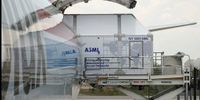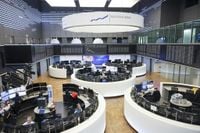European equities faced a significant downturn on April 16, 2025, as the ongoing trade tensions between the United States and China intensified, leading to a ripple effect across the markets. The Stoxx Europe 600 Index fell by 0.9% at 8:15 a.m. in London, marking the end of a two-day winning streak. This decline was primarily driven by investor concerns over the U.S. government's recent restrictions on chipmaker Nvidia Corp., which has barred the company from selling its H20 chip in China, escalating the tech battle between Washington and Beijing.
In Germany, the DAX index dropped 0.5%, while France's CAC 40 slipped by 0.7%, and the UK's FTSE 100 fell by 0.3% at 03:05 ET (07:05 GMT). The trade war's impact on the global economy has raised alarm bells, with many investors fretting about the potential ramifications of these new tariffs and export controls.
President Donald Trump has ordered an investigation into possible new tariffs on all U.S. imports of critical minerals, a move that could further strain relations with China, the largest supplier of these materials. This development comes on the heels of Nvidia's announcement that it expects to incur up to $5.5 billion in charges related to U.S. export controls on China, overshadowing positive growth figures from Beijing, where the GDP grew by 5.4% in the first quarter, surpassing expectations of 5.2%.
Despite the positive GDP data, concerns linger as the U.S. has recently raised tariffs on Chinese goods to a staggering 145%. This drastic increase could be seen as the calm before a storm, as analysts predict further economic uncertainty.
In the corporate sector, ASML Holding NV faced a steep decline in its stock price, plummeting as much as 7.6% after failing to meet first-quarter orders expectations. The Dutch semiconductor equipment manufacturer reported a 12.4% sequential drop in earnings per share, now standing at just €6, despite a slight improvement in gross margin to 54%. The company's turnover contracted by 16.4% to €7.74 billion, while net orders fell by a staggering 44.5% to €3.94 billion.
ASML's CEO, Christophe Fouquet, expressed concerns about the uncertainty surrounding tariffs, stating, "Our conversations with our customers to date support our forecast that 2025 and 2026 will be years of growth, but the recent announcements of tariffs have increased the uncertainty of the macroeconomic environment." The company has set ambitious targets for the current quarter, aiming for a turnover between €7.2 billion and €7.7 billion and a gross margin of 50% to 53%. For the full year, ASML is still targeting revenues of between €30 billion and €35 billion.
Meanwhile, the brewing giant Heineken reported a modest 0.9% increase in first-quarter organic net revenues, just exceeding expectations for a slight decline amidst tariff uncertainties. Nordea Bank also posted stronger-than-expected first-quarter profits, benefiting from increased income and decreased expenses.
As oil prices reacted to the prevailing economic uncertainty, Brent crude futures fell by 0.8% to $64.18 a barrel, while U.S. West Texas Intermediate crude dropped by the same percentage to $60.82 a barrel. The International Energy Agency (IEA) has revised its forecast for global oil demand growth down to 730,000 barrels per day for 2025, a significant decrease from the previous estimate of 1.03 million barrels per day, reflecting the impact of Trump's tariffs and the resulting trade tensions.
In the UK, inflation rates showed signs of slowing, with the consumer price index dropping to an annual rate of 2.6% in March from 2.8% in February. This decrease raises the likelihood that the Bank of England may cut interest rates in its upcoming meeting in May. The central bank held rates steady at 4.5% in March, with an 8-1 voting pattern favoring this decision.
As the European Central Bank prepares to meet on April 17, expectations are growing that policymakers will agree to a 25-basis-point cut, potentially lowering the ECB’s deposit rate to 2.25%. This move is anticipated as a response to the current economic climate and inflation trends.
The day’s trading session reflected broader concerns about the stability of the global economy, with technology stocks being the hardest hit. The combination of Nvidia's export restrictions and ASML's disappointing orders has left investors wary, as they navigate through a landscape of increasing tariffs and economic uncertainty.
While some companies like Heineken and Nordea Bank have managed to weather the storm, the overall sentiment in the market remains cautious. The trade war between the U.S. and China continues to cast a long shadow over the global economy, raising questions about the future trajectory of growth and stability in the coming months.






